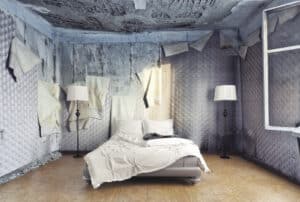Did you know that mold spores are present in the air you breathe every day? They can not only affect the structural integrity of your home but also have negative implications for your health. Are you taking the necessary steps to protect yourself and your home from mold spores?
Mold is a common problem in many households, especially in areas with high humidity levels. It can grow in damp areas such as bathrooms, basements, or even hidden behind walls. Mold not only damages the structure of your home but also releases spores that can cause respiratory issues, allergies, and even pose serious health risks.
Protecting your home and health from mold spores is crucial for maintaining a safe and comfortable living environment. By being aware of the potential risks and taking preventative measures, you can minimize the chances of mold growth and ensure better air quality in your home. In this article, we will discuss effective strategies to safeguard your home and health from mold spores in the air.
Mold Spores in the Air?
Mold spores are microscopic airborne particles that can cause a variety of health issues and damage to your home. It is important to take proactive measures to protect both your home and your health from mold spores in the air.
Here are some effective steps you can take to reduce mold spores in the air:
1. Keep your home dry:
Mold thrives in damp and humid environments. To prevent mold growth, ensure that your home is properly ventilated and keep moisture levels low. Use exhaust fans in bathrooms and kitchens, repair any leaks promptly, and consider investing in a dehumidifier for high humidity areas.
Read More-10 Signs Your Basement Needs Waterproofing
2. Regularly inspect and clean:
Take time to inspect your home for any signs of mold growth, such as visible patches or a musty odor. If you detect any mold, it is crucial to address it immediately. Clean affected areas with a solution of water and detergent, and dry them completely. Discard any items that cannot be cleaned thoroughly.
3. Monitor indoor humidity levels:
The ideal indoor humidity level should be kept below 50 percent. Use a hygrometer to measure humidity levels in your home. If necessary, use air conditioners, fans, or dehumidifiers to maintain optimal humidity levels.
4. Improve air circulation:
Good air circulation helps prevent moisture buildup and reduces the presence of mold spores in the air. Keep your windows open whenever possible to allow fresh air to flow through, and consider using fans to improve airflow in enclosed spaces.
5. Use mold-resistant products:
When renovating or building your home, opt for mold-resistant materials such as mold-resistant drywall, paints, and insulation. These products are formulated to inhibit mold growth and can significantly reduce the risk of mold-related issues.
6. Clean and maintain HVAC systems:
Mold spores can circulate through your home via your heating, ventilation, and air conditioning (HVAC) system. Regularly clean and inspect the HVAC system, change filters as recommended, and ensure that air ducts are free from obstructions.
Read More-Can Dirty Air Ducts Make You Sick?
7. Consider air purifiers:
High-quality air purifiers with HEPA filters can effectively remove mold spores from the air, improving indoor air quality. Place them strategically in rooms prone to moisture or where mold problems have occurred before.
8. Take precautions during outdoor activities:
Mold spores are present in outdoor environments as well. When engaging in outdoor activities like gardening or yard work, wear protective clothing, gloves, and a mask to minimize exposure to mold spores.
9. Seek professional help:
If you have persistent or extensive mold problems in your home, it is best to seek professional assistance like Dry Effect Restoration Services. Our mold remediation specialists can identify the root cause of the mold growth and properly eliminate it, ensuring your home and health are protected.
By implementing these measures, you can significantly reduce the risk of mold spores in the air and safeguard your home and health from the potential dangers associated with mold. Remember, prevention and proactive maintenance are key to a mold-free environment.


 Emergency Preparedness: What to Do When Your House Floods
Emergency Preparedness: What to Do When Your House Floods
Leave a Reply